Are you into cars and want to make your diecast collection special? Painting and customizing diecast models is a fun hobby. It lets you make your favorite cars unique. But, with so many paints out there, how do you get a top-notch finish? This guide will give you expert tips for what paint to use on diecast models, diecast model customization, and painting diecast cars.
Key Takeaways
- Choosing the right paint type is crucial for a successful diecast model customization project.
- Proper surface preparation and painting techniques are essential for a professional-looking finish.
- Investing in high-quality materials and following expert advice can help you avoid common mistakes and ensure your diecast models stand out.
- Displaying your newly painted diecast cars in the right environment can enhance their visual appeal.
- Experimenting with different paint types and techniques can help you develop your skills and create unique designs.
Understanding Different Types of Paint for Diecast Models
Choosing the right paint for diecast models is key to a great finish. Acrylic paints are perfect for beginners, while enamel paints offer a professional look. Knowing the differences between these paints helps you pick the best one for your project.
Acrylic Paints for Beginners
Acrylic paints are great for newbies. They dry fast and are easy to clean up. You can find them in many colors, making it easy to get creative. Brands like AMMO by Mig Jimenez and Citadel are popular choices.
Enamel Paints for Professional Finish
Enamel paints give a glossy finish like real car paint. They dry slowly, allowing for a smooth finish. They last long and keep their color bright. Brands like Humbrol and Revell are favorites among pros.
Automotive Lacquers for Authenticity
Automotive lacquers offer the best look and durability. They come in many shades and finishes. Lacquers are hard and don’t chip easily, making them ideal for experts.
Every paint has its own benefits. Your choice depends on your skill, preference, and model needs. Always apply paint in thin layers, letting each dry fully for the best results.
Essential Preparation and Materials for What Paint to Use on Diecast Models
Painting diecast models needs careful prep and the right tools for top results. First, collect all needed supplies. This includes the diecast cars, primer, quality brushes, masking tape, clear coat, and safety gear like gloves and a well-ventilated area.
Start by cleaning the model with dish soap and water to remove dust or dirt. Use #400 grit sandpaper to smooth the surface for painting. Always wear gloves to avoid oil from your skin getting on the metal.
Then, apply etching primer in thin layers, letting it dry fully. Sand the primed area and clean it again for the best paint adhesion. It’s important to work in a cool environment, below 70°F (21°C), to help the paint flow smoothly and avoid problems like fisheyes or orange peel.
- Diecast cars
- Primer
- High-quality brushes
- Masking tape
- Clear coat
- Protective gear (latex gloves, well-ventilated workspace)
With the right prep and tools, you’re ready to make amazing diecast models and diecast detailing projects. Remember, being patient and practicing will help you get professional-looking results.
Professional Painting Techniques and Surface Preparation
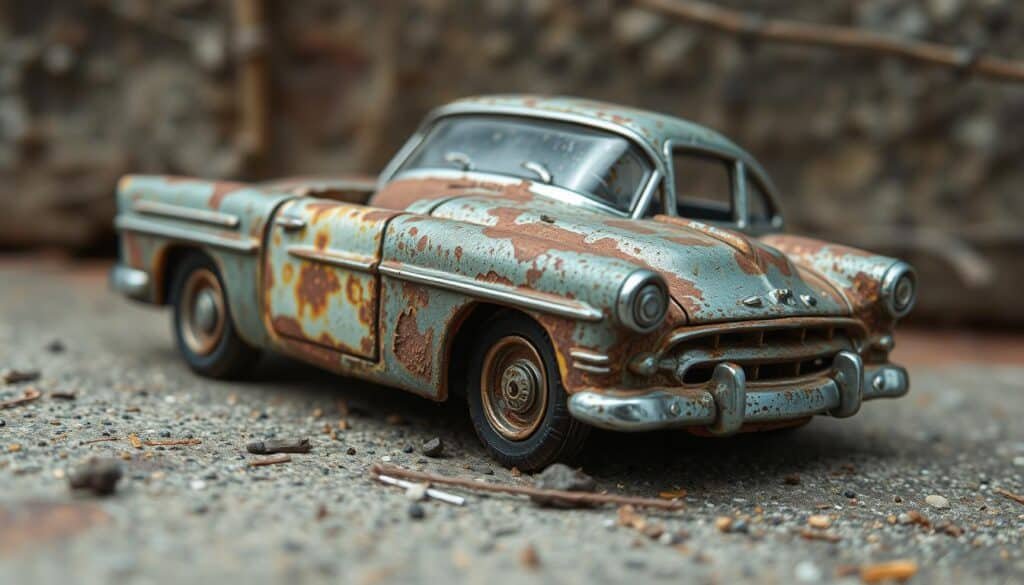
To get a pro finish on your diecast models, focus on surface prep and painting techniques. First, clean the model well to get rid of dirt, grease, or oil. Use dish soap, n-Butyl Acetate solvent, and ammonia-based window cleaner for a clean surface. This method ensures the paint sticks well and looks perfect.
Proper Cleaning and Surface Treatment
Cleaning and treating the surface are key before painting. Start with a dish soap and water soak to remove dirt. Then, rinse with hot water and use n-Butyl Acetate to degrease. Finish with ammonia-based window cleaner and a wipe down. This multi-step cleaning keeps the surface ready for paint.
Priming Techniques
Once the surface is clean and dry, prime it. Apply primer in thin, even layers, letting each dry before adding more. Lightly sand the primed surface for a smooth base coat. Priming helps the paint stick and ensures a uniform surface.
Paint Application Methods
Choose the right paint for your model. Acrylic paints are easy to use and come in many colors, but they need a special application. Use brushes sizes 1 to 4 for details and try dry brushing, edge highlighting, and wet blending for a pro look.
Clear Coating and Finishing
To seal your work and add a glossy finish, apply clear coat layers. Let each layer dry fully before adding more. Use compressed air to remove dust. The clear coat makes the paint last longer and looks better.
By using these pro painting methods and focusing on surface prep, you can make your diecast models look amazing. Remember, the details and a careful approach are what make a finish look weathered and real.
Conclusion
Painting diecast models is a fun hobby that mixes science and art. It starts with cleaning and priming well. Beginners should begin with simple designs and be patient.
Try out different colors and techniques to find your style. Use high-quality references for accuracy. This way, you can make unique pieces for display or to enhance your collection.
With practice and patience, anyone can get professional-looking results in diecast model customization. By learning model painting techniques, you can create special pieces. Always remember to be safe, use the right tools, and enjoy the process of painting diecast models.
Whether you’re experienced or new to this hobby, this guide will improve your skills. Start your journey and let your creativity show in every stroke.
FAQ
What type of paint should I use for diecast model customization?
What materials do I need for painting diecast models?
How do I properly prepare the surface of a diecast model before painting?
What are the key professional techniques for painting diecast models?
How can I achieve a unique and personalized look for my diecast model?
Source Links
- How to Paint Over a Diecast Car: 12 Steps (with Pictures) – https://www.wikihow.com/Paint-Over-a-Diecast-Car
- A Detailed Guide to Painting Diecast Car Models – https://livecarmodel.com/blog/a-detailed-guide-to-painting-diecast-car-models/?srsltid=AfmBOorvhY8bhoasdJIz9BGeuQtk5uaTUbhdNSdbcpSF-hbMPHphN-nd
- A Reference Guide to Get Started – https://www.megahobby.com/hobby-paint-101/?srsltid=AfmBOooAp9vubfRV38-Xlpq1h6O6Adkq8MPnRNZ-ufkcr3vhrVIGueR9
- Acrylic vs. Enamel Paint for Scale Model Cars – https://www.autoworldstore.com/blogs/tips-tricks/acrylic-vs-enamel-paint-for-scale-models?srsltid=AfmBOoqONdjUjYzC5t0HdLOvR0lTLqb7rEwT9iN09lPJVCSAN9C4gJ6C
- Understanding undercoat – https://www.planetdiecast.com/index.php?option=com_kunena&func=view&catid=83&id=28769&Itemid=0
- A Detailed Guide to Painting Diecast Car Models – https://livecarmodel.com/blog/a-detailed-guide-to-painting-diecast-car-models/?srsltid=AfmBOorz9g57tS1d1n24y2JNLEJuHI4rAxZE5XccyeZTNY1C6j2Xi8rU
- How do you prepare the plastic model for painting – https://forum.mrhmag.com/post/how-do-you-prepare-the-plastic-model-for-painting-12185662
- Painting Models: Advanced Techniques – https://uk.airfix.com/community/advice/Painting-models-advanced-techniques
- Brush Painting Acrylics – HELP! – FineScale Modeler – https://cs.finescale.com/fsm/tools_techniques_and_reference_materials/f/18/t/18844.aspx
- A Guide to Master Diecast Car Customization – https://lasertransfersupplies.com/blogs/articles/guide-to-master-diecast-car-customization
- Understanding and Protecting Yourself When using Model Craft kits : Acrylics, Enamels, and Lacquers – https://thefacemaskstore.co.uk/the-face-mask-store-blog/understanding-and-protecting-yourself-when-using-model-craft-kits-acrylics-enamels-and-lacquers/
- 7 Best Ways to Protect Painted Miniatures – A-Case – https://shop.army-case.com/7-best-ways-to-protect-painted-miniatures/

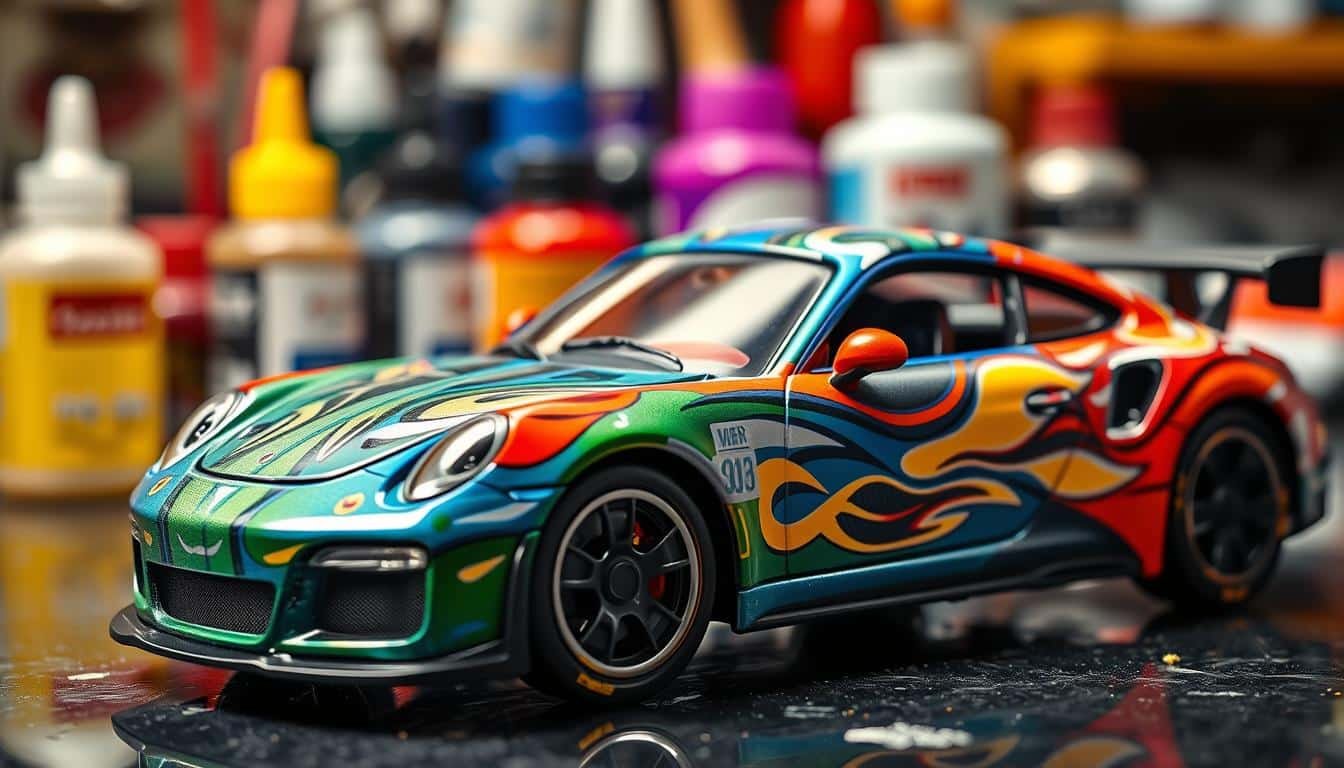

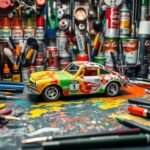


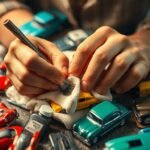
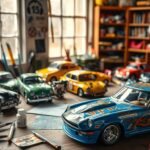
Enamel paints for a professional finish? What about those who nail it with acrylics? Isnt skill over material more important?
Anyone else think enamel paints are undervalued? They really do provide a professional finish unlike any other! Thoughts?
Totally agree! Enamel paints are the unsung heroes of the painting world. Totally underrated!
Interesting read, but does anyone else wonder why oil-based paints werent mentioned, considering their durability on diecast models?